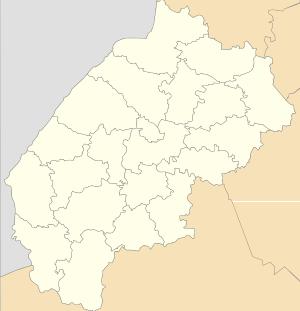Nahuievychi
Nahuievychi (Nahuyevychi, old name - Solne, Bashevo, from 1951 to 2009 - Ivana-Franka) (Ukrainian: Нагує́вичі, Іва́на-Франка́, стара назва - Со́льне, Ба́шево) (Polish: Nahujowice) is a village in Drohobych Raion, Lviv Oblast, Ukraine.
Nahuievychi Нагуєвичі | |
|---|---|
 Nahuievychi | |
| Coordinates: 49°21′43″N 23°19′14″E | |
| Country | |
| Province | |
| District | |
| Established | 1050 |
| Area | |
| • Total | 28.711 km2 (11.085 sq mi) |
| Elevation /(average value of) | 334 m (1,096 ft) |
| Population | |
| • Total | 2 518 |
| Time zone | UTC+2 (EET) |
| • Summer (DST) | UTC+3 (EEST) |
| Postal code | 82126 |
| Area code | +380 3244 |
| Website | село Нагуєвичі (Ukrainian) |
The village covers an area of 28.711 km2 and the population of village is about 2518 persons.[1] Local government is administered by Nahuievytska village council.[2]
The village Nahuyevychi is the birthplace of poet and writer Ivan Franko (1856 - 1916).
Geography
The village is located in a picturesque corner in the foothills of the Carpathians of Drohobych district at a distance 15 kilometres (9.3 mi) from the district center Drohobych, 92 kilometres (57 mi) from the regional center of Lviv and 26 kilometres (16 mi) from the town of Sambir.
History
The first written mention dates back to year 1050[3] and had the name Solne, afterwards Bashevo. The village was called Nahuyevychi (Ukrainian: Нагує́вичі) from 1240.
Museums and monuments
In the village there are Franko's farmstead and museum.
The village has two sights of architecture Drohobych district:[4]
- Church of St. Nicholas (wooden) 1800 (1352 /1)
- The bell tower of the church of St. Nicholas (wooden) 1800 (1352 /2)
Personalities
- Ivan Franko (1856 – 1916) – famous Ukrainian activist, a Ukrainian poet, writer, doctor of philosophy, ethnographer. Franko was born in Naguievychi in Austrian-controlled eastern Galicia, today part of the Lviv Oblast (province of Ukraine), and was the son of a village blacksmith, of German ancestry.[5]
References
External links
Literature
- Історія міст і сіл УРСР: Львівська область, Івана Франка. – К. : ГРУРЕ, 1968 р. Page 286 (in Ukrainian)